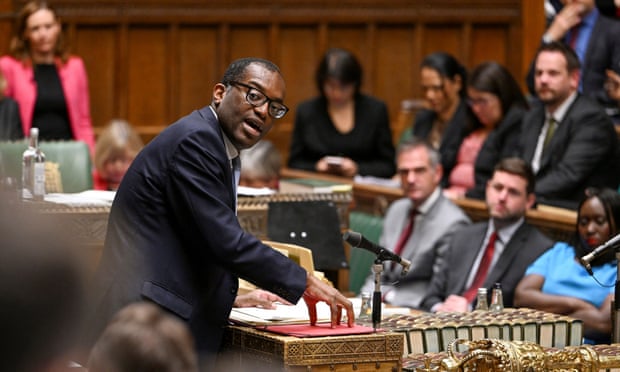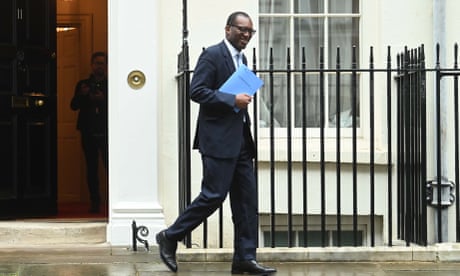UK
‘A budget for the 1%’: government accused of huge tax cut for super-wealthy
Kwasi Kwarteng’s measures benefit the rich at expense of struggling families, say critics

The government stands accused of introducing a “simply staggering, huge tax cut for richer households” that will leave “the super-wealthy laughing all the way to the actual bank”, while allowing hundreds of thousands of already-struggling families to fall deeper into poverty.
On Friday, Kwasi Kwarteng, the chancellor, announced a string of tax giveaways and other measures that economists and campaigners claim will hugely benefit the super-rich at the expense of hardworking people.
The measures include:
Scrapping the 45p additional tax rate on earnings above £150,000.
Axing the cap on bankers’ bonuses.
Scrapping the planned rise in corporation tax to 25%.
Doubling the stamp duty “holiday” on property purchases to £250,000.
Allowing the overseas wealthy to shop duty free anywhere in the UK – not just at airports.
Axing the planned rise in national insurance contributions.
Tightening the benefits rules to make it harder for part time workers on universal credit.
The combined package of measures announced in the mini-budget means that someone who currently makes £1m will gain £55,220 a year, while someone earning £20,000 will be just £157 better off, according to calculations by the Resolution Foundation.
Torsten Bell, the chief executive of the thinktank, said the policies “amount to a simply staggering, huge tax cut for richer households”.
Bell described the mini-budget as socially divisive, and said almost 45% of the £45bn worth of tax cuts would “go to the richest 5% alone, who will be £8,560 better off”.
“In contrast, just 12% of the gains will go to the poorest half of households, who will be £230 better off on average next year.”
There are 3,519 bankers working in the UK making more than €1m a year (£880,000) according to the European Banking Authority (EBA). That is more than seven times as many as those in Germany, which has the second highest number of €1m-a-year bankers. The EBA figures show 27 UK bankers made more than €10m in 2019 (the latest year available).
Nicola Sturgeon, Scotland’s first minister, said: “The super-wealthy laughing all the way to the actual bank. While increasing numbers of the rest are relying on food banks – all thanks to the incompetence and recklessness of this failed UK government.”
Paul Johnson, the director of the Institute for Fiscal Studies thinktank, said the abolition of the 45p tax rate on incomes over £150,000 was “a surprise” that “helps roughly highest income 1%.”
Johnson said combined the measures amounted to “the biggest tax cutting event since 1972”.
Alison Garnham, the chief executive of Child Poverty Action Group, described the budget as “a statement for the 1%” and said it was “more bankers’ bonuses than helping hungry kids”.
“Today was a vital opportunity to provide reassurance and support to those who need it the most,” she said. “But instead the government risks a collision with reality, and the 4 million kids currently living in poverty in the UK will be forced to pay the price.”
Frances O’Grady, the general secretary of the TUC, said: “The government was “making it easier for City bankers to help themselves – making it harder for workers to win better pay and conditions”.
Luke Hildyard, the executive director of the High Pay Centre, a thinktank that focuses on excessive pay, said: “By scrapping the bankers’ bonus cap and cutting tax on the richest 1% of the population, the government is doubling down on a failed economic strategy.
“The richest households in the UK already rake in more than the richest in most European countries.”
He said that instead of “bending over backwards for people who are already extremely well off”, the government should concentrate on “re-balancing income and wealth in favour of low- and middle-income earners”.
James Perry, a multimillionaire and founding member of Patriotic Millionaires, a campaign group calling for higher taxes on the very wealthy, described Kwarteng’s mini-budget as “an abdication of responsibility for sound financial management”.
Perry, who made a fortune from a frozen ready meals company, said that instead of scrapping the high rate of tax Kwarteng should have introduced more taxes on the wealthy.
“We have to deal with the phenomenon of extreme wealth, a vast pool of capital held by a very few. Policies like scrapping the bankers’ bonus cap and the top rate of income tax will do the opposite.
“When 70% of the public are saying it’s time to raise taxes on extreme wealth to invest in our country – and millionaire investors like me agree – why would the government not do the right and obvious thing and get on with it?”
Kwarteng scraps top 45% rate of income tax and cuts stamp duty
Chancellor abolishes cap on banker bonuses, cuts basic income tax and national insurance in mini-budget that favours top earners
Kwasi Kwarteng delivers sweeping cuts in latest mini-budget – video highlights
Phillip Inman and Rowena Mason
Kwasi Kwarteng has bet the government’s re-election in 2024 on the biggest tax cuts in 50 years after the UK chancellor announced reductions in the top 45% rate of income tax, national insurance and stamp duty worth £45bn.
Facing accusations of a “class war” mini-budget that rewarded the rich more than those on lower incomes, Kwarteng said his efforts to boost growth and energise the economy included helping all households after he brought forward a planned 1p cut in the basic rate of income tax from 2024 to next year.
The top 45p income tax rate on earnings of more than £150,000 a year will be scrapped, leaving the highest rate at 40p. The main income tax changes predominantly apply in England, Wales and Northern Ireland.

Kwasi Kwarteng announces ‘investment zones’ with huge tax cuts for businesses
The Treasury acknowledged after the budget that about 660,000 of the highest earners will benefit from the scrapping of the 45p rate, getting back on average £10,000 a year.
A Treasury spokesperson said the chancellor “disagreed” that it was a budget for the rich or that it was “trickle-down economics”, but the aim was that “growing the economy benefits everyone”.
A rise in national insurance of 1.25% brought in earlier this year will be reversed, saving households £330 a year.
Thresholds for paying stamp duty – which applies in England and Northern Ireland – will be increased, cutting the tax paid on purchasing homes.
The threshold at which first-time buyers begin to pay stamp duty will increase from £300,000 to £425,000, and the maximum value of a property on which first-time buyers’ relief can be claimed will also increase, from £500,000 to £625,000. The chancellor said the cuts would be permanent.
Kwarteng also confirmed that caps on bankers’ bonuses would be scrapped.
Promising a new era of growth, he said: “High taxes reduce incentives to work and they hinder enterprise.”
Against a backdrop of high inflation and forecasts that Britain faces a long recession, the chancellor cancelled a rise in corporation tax from 19% to 25% next year.
“In the context of the global energy crisis it is entirely appropriate for the government to take action,” he said, adding that “fiscal responsibility remains essential” and he would be allowing the Office for Budget Responsibility (OBR) to examine the Treasury’s spending plans before the end of the year. The OBR, which provides independent economic forecasts based on the government’s plan, was blocked from assessing the mini-budget by Kwarteng.
The Treasury, when asked why it could not produce OBR forecasts, claimed it would not be able to publish full forecasts in time. It admitted there were no forecasts for how much the growth plan would boost growth, or when Kwarteng hoped to reach the 2.5% growth target.
He is reviewing his fiscal rules but these will not be set out at this stage. The Treasury continued to insist it was not a budget, so therefore was not accompanied by the traditional distributional impact showing how the measures would affect the rich and the poor.
Labour described the mini-budget as a “menu without prices” that rewarded better-off households while gambling with the public finances.
Conservative backbenchers gave an extremely muted response to Kwarteng, unusually refraining from cheering or banging their seats behind the chancellor. Several Tory MPs told the Guardian they were worried about the political implications of giving tax cuts to the rich, while providing little help for most of the population with the cost of living beyond the 1p cut in income tax.
In contrast, Labour MPs were outraged by the measures and buoyed by the idea that voters would reject the Tories, with one shadow cabinet minister saying they thought it would “go down like a bucket of sick” in the “red wall” constituencies.
Leftwing Labour MPs Richard Burgon and Paula Barker said Kwarteng’s decision to skew tax cuts to the better-off amounted to a campaign of “class war”.
Financial markets were fearful about the extra borrowing needed to fund Kwarteng’s huge tax cuts, sending the pound plunging below $1.11 for the first time since 1985. The government’s borrowing costs jumped after the two-year borrowing rate doubled from last month to 4%.
Benchmark 10-year gilt prices also weakened, pushing up their yield to the highest since 2011.

British retailers welcome planned return of VAT-free shopping for tourists
Paul Johnson, the director of the Institute for Fiscal Studies, said the tax cuts would cost £41bn in 2024 and £45bn in 2026, making the mini-budget the “biggest tax-cutting event since 1972”.
Recalling the Heath government’s attempt in the early 1970s to boost growth with huge tax cuts orchestrated by the then chancellor, Tony Barber, Johnson said: “Barber’s ‘dash for growth’ then ended in disaster. That budget is now known as the worst of modern times. Genuinely, I hope this one works very much better.”
Kwarteng also announced planned rises in beer, wine and spirit duties would be cancelled and said he would cut welfare benefits if unemployed people failed to comply with the requirements to search for a job.
He said it was outrageous that strikes were bringing vital services to a halt. He said he would bring forward legislation making it illegal to hold a strike from taking place until “talks have genuinely broken down”.
No comments:
Post a Comment